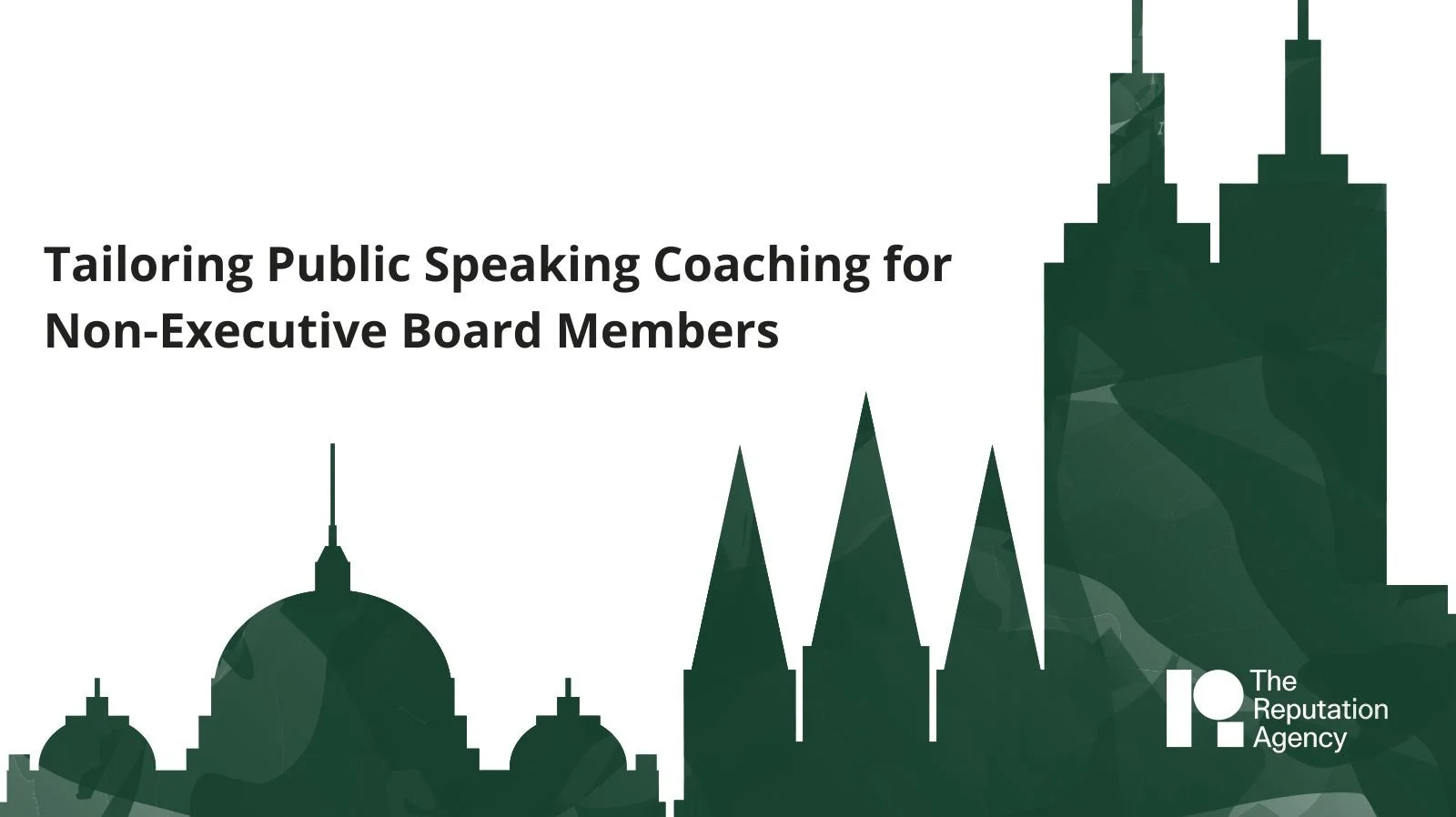Tailoring Public Speaking Coaching for Non-Executive Board Members
Why Public Speaking Matters for Non-Executive Board Members
Non-executive board members play a critical role in shaping governance, strategy, and stakeholder confidence. Public speaking is a key skill for communicating insights, participating in shareholder meetings, and engaging with stakeholders. Tailored coaching ensures non-executive directors can speak with clarity, authority, and confidence, enhancing both personal effectiveness and the organisation’s reputation.
Challenges Non-Executive Board Members Face in Public Speaking
Limited Exposure to Media and Public Engagement
Non-executive board members often have less hands-on experience with public communications than executives. They may be called upon to speak at shareholder meetings, industry events, or in media interviews without the same training or familiarity.
Need for Clarity and Confidence
Board members must convey complex governance or strategic information in an understandable and compelling way. Lack of preparation or confidence can lead to miscommunication, ambiguity, or reputational risk.
Tailored Public Speaking Coaching for Non-Executive Directors
1. Assess Individual Needs
Coaching begins with understanding each board member’s experience, strengths, and areas for improvement:
Previous public speaking or media experience
Comfort with technical, financial, or strategic topics
Personal communication style and confidence level
Assessment ensures coaching is personalised and impactful.
2. Develop Clear Key Messages
Non-executive directors must communicate succinctly and effectively. Coaching focuses on:
Distilling complex topics into clear, accessible messages
Highlighting the most critical points relevant to the audience
Ensuring alignment with organisational values and strategy
Strong key messages help board members convey authority and credibility.
3. Practice Scenario-Based Engagement
Role-playing and scenario-based exercises simulate real-life speaking situations:
Shareholder meetings and board presentations
Media interviews and panel discussions
Stakeholder or community engagements
Practising in realistic scenarios builds confidence and prepares members to respond effectively under pressure.
4. Enhance Delivery and Presence
Effective delivery is as important as content. Coaching addresses:
Voice modulation, pacing, and articulation
Body language, posture, and eye contact
Handling difficult questions with composure
Improved presence ensures board members communicate confidently and leave a positive impression.
5. Provide Feedback and Continuous Improvement
Ongoing feedback and refinement are essential:
Video recordings of practice sessions for self-review
Constructive feedback from coaches and peers
Continuous skill-building exercises to maintain proficiency
This iterative approach ensures skills are strengthened over time, preparing members for varied communication challenges.
Did You Know?
Board members who receive tailored public speaking coaching are 50% more effective in conveying complex strategic information and engaging stakeholders confidently.
Enhancing Board Effectiveness Through Coaching
Tailored public speaking coaching equips non-executive board members to communicate effectively, represent the organisation with confidence, and contribute to stronger governance. By focusing on clarity, presence, and scenario-based practice, coaching enhances both personal effectiveness and organisational reputation.
Need Public Speaking Coaching for Your Board?
The Reputation Agency provides customised media and public speaking coaching for non-executive board members. Learn more about our media training and public speaking services to elevate board-level communication and impact.
FAQs
1. Why is public speaking coaching important for non-executive board members?
t helps them communicate complex topics clearly, engage stakeholders confidently, and represent the organisation effectively.
2. What topics are covered in tailored coaching?
Key messages development, scenario-based role-playing, delivery techniques, body language, and handling difficult questions.
3. How is coaching personalised for each board member?
It starts with assessing individual strengths, experience, and comfort level, then targets specific areas for improvement.
4. Can coaching help with media interactions?
Yes, scenario-based exercises include media interviews, stakeholder panels, and public presentations to build confidence.
5. How is progress measured in public speaking coaching?
Through feedback, video review, mock presentations, and ongoing practice, board members can track improvements in clarity, confidence, and delivery.

